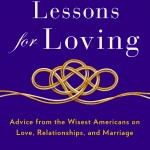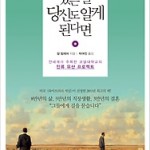I’ve spent a lot of time over the past six years interviewing the oldest Americans about their lessons for living — advice they  would like to pass on to future generations. As described in the book 30 Lessons for Living, the elders have outstanding advice on the “big picture” issues: love and marriage, child-rearing, choosing a career, health and of course, aging well.
would like to pass on to future generations. As described in the book 30 Lessons for Living, the elders have outstanding advice on the “big picture” issues: love and marriage, child-rearing, choosing a career, health and of course, aging well.
Sometimes, however, I have had an epiphany from hearing a brief thought or phrase from the elders. When confronted with a work problem, a stressful event, or just the usual tension that can build up during the day, I find that the voice of one or another of the elders will come to me and help me re-think the situation. I’ve come to call these my “elder mantras.”
Here are a few of these “mantras” that I find particularly helpful, all from wise people in their 80s and beyond. They reflect some of the core elements of elder wisdom.
Swimming in the sea of life
Paul, 85, had a successful and high-powered career as an architect. After both a hectic career and personal life, he has found old age to be a time of both clarity and serenity. When asked: “What have you learned during your life that you would like to pass on to a younger person,” he said:
“I’ve learned how to swim. ”
That was a surprise, and when questioned, Paul went on:
I’ve learned how to swim. In life. I’m not a particularly good swimmer in water, but I’m a reasonable swimmer in the flow of living.
This image of learning to swim in the river of life, of going with the flow of living, is a powerful and serene image when called up during a busy day.
Let it be
This mantra comes from Sister Clare Moran, whom I interviewed shortly before her 100th birthday. (I can’t give all the details here, but believe me when I say: If you want to hear about an interesting life, sit down for a while with a 100-year old nun!)
Reflecting on her nearly 80 years in the religious life, Sister Clare pointed to doing away with worry as her lesson for younger people. Early in her career as a nun, she learned a technique for reducing worry through pursuing acceptance:
There was a priest that said mass for us, a youngish priest, very fragile and frail. Beautiful, beautiful man. He said that at a certain time of his life, something happened; he didn’t tell us what it was. I heard that he had been working on a mission and they asked him to come back to the States and it broke his heart. It must have been a very hard thing to do. And he was very angry, he just couldn’t be resigned, just couldn’t. He got back into work here, but he couldn’t get his mind off it. Just couldn’t see why it had happened.So he went to an elderly priest and he talked to him about it. He said, “What shall I do? I can’t get rid of it.” And the priest said, “Every time it comes to your mind, say this.” And the priest said very slowly, “Just let it be, let it be.” And this young man was saying it just the way the priest said it and he said, “I tried that and at first it didn’t make any difference, but I kept on. After a while, when I pushed it aside, let it be, it went away. Maybe not entirely, but it was the answer.”
Sr. Clare, one of the most serene people I have ever met, has used this technique for well over three-quarters of a century.
So many things come to your mind, now for instance somebody might hurt your feelings, you’re going to get back at him or her, well — just let it be. Push it away. So I started doing that, I found it the most wonderful thing because everybody has uncharitable thoughts, you can’t help it. Some people get on your nerves and that will be there until you die. But when they start and I find myself thinking, “Well now she shouldn’t do that, I should tell her that…” Let it be. Often, before I say anything, I think, “If I did that, then what?” And let it be. Oh, so many times I felt grateful that I did nothing. That lesson has helped me an awful lot.
A feather from an angel’s wing
Flora, 80, is a poet who writes about her love of the landscapes of the Southwest. Her approach to living is to embrace the pleasures each day can hold, and she reinforces that attitude with a daily habit. One phrase stands out as a mantra.
If I were to give any particular word of advice I would say: Go about the business of the day, hum-drum as it might be, but walk on your tip-toes waiting for the “ah-ha!” experiences. That happens when you’re going around the corner doing the normal everyday things. So be prepared for those ah-ha experiences that may happen any time. That way, you’re always open to and watching for something different — watching for a feather from an angel wing.
It’s sorry you didn’t do…
One last mantra I carry with me is from Eleanor, who says about regrets: “Mostly it’s sorry you didn’t do than sorry you did!”
You can meet her (on video) as well as other elders sharing their wisdom.
 at Ithaca College. She is majoring in gerontology and plans to minor in Legal Studies. Zoe was excited to learn from the elders themselves through the Legacy Project’s in-depth interviews. This lesson about the role of financial planning in maintaining independence throughout life came from Richard, age 68.
at Ithaca College. She is majoring in gerontology and plans to minor in Legal Studies. Zoe was excited to learn from the elders themselves through the Legacy Project’s in-depth interviews. This lesson about the role of financial planning in maintaining independence throughout life came from Richard, age 68. 








